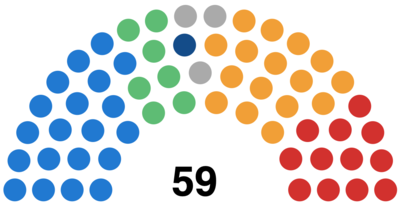# The (Secret) City of London -- Part 1
The Great City of London, known for its historical
landmarks, modern skyscrapers, ancient markets
and famous bridges. It's arguably the financial
capital of the world and home to over eleven
*thousand* people.
Wait, what? Eleven... thousand?
That's right: but the City of London is a
different place from London -- though London
is also known for its historical landmarks,
modern skyscrapers, ancient markets, famous
bridges and is home to the government, royal
family and seven million people.
But, if you look map of London crafted by
a careful cartographer that map will have
a one-square mile hole near the middle -- it's
here where the City of London lives inside
of the city named London.
Despite these confusingly close names the
two Londons have separate city halls and elect
separate mayors, who collect separate taxes
to fund separate police who enforce separate
laws.
The Mayor of the City of London has a fancy
title 'The Right Honourable the Lord Mayor
of London' to match his fancy outfit. He also
gets to ride in a golden carriage and work
in a Guildhall while the mayor of London has
to wear a suit, ride a bike and work in an
office building.
The City of London also has its own flag and
its own crest which is awesome and makes London's
lack of either twice as sad.
To top it off the City of London gets to act
more like one of the countries in the UK than
just an oddly located city -- for uniquely
the corporation that runs the city of London
is older than the United Kingdom by several
hundred years.
So how did the UK end up with two Londons,
one inside of the other? Because: Romans.
2,000 years ago they came to Great Britain,
killed a bunch of druids, and founded a trading
post on the River Thames and named it Londonimium.
Being Romans they got to work doing what Romans
do: enforcing laws, increasing trade, building
temples, public baths, roads, bridges and
a wall to defend their work.
And it's this wall which is why the current
City of London exists -- for though the Romans
came and the Romans went and kingdoms rose
and kingdoms fell, the wall endured protecting
the city within. And The City, governing itself
and trading with the world, grew rich.
A thousand years after the Romans (yet still
a thousand years ago) when William the Conqueror
came to Great Britain to conqueror everything
and begin modern british history he found
the City of London, with its sturdy walls
more challenging to defeat than farmers on
open fields.
So he agreed to recognize the rights and privileges
City of Londoners were used to in return for
the them recognizing him as the new King.
Though after the negotiation, William quickly
built towers around the City of London which
were just as much about protecting William
from the locals within as defending against
the Vikings from without.
This started a thousand-year long tradition
whereby Monarchs always reconfirmed that 'yes'
the City of London is a special, unique place
best left to its own business, while simultaneously
distrusting it.
Many a monarch thought the City of London
was too powerful and rich. And one even built
a new Capital city nearby, named Westminster,
to compete with the City of London and hopefully,
suck power and wealth away from it. This was
the start of the second London.
As the centuries passed, Westminster grew
and merged with nearby towns eventually surrounding
the walled-in, and still separate City of
London. But, people began to call the whole
urban collection 'London' and the name became
official when Parliament joined towns together
under a single municipal government with a
mayor.
But, the mayor of London still doesn't have
power over the tiny City of London which has
rules and traditions like nowhere else in
the country and possibly the world.
For example, the ruling monarch doesn't just
enter the City of London on a whim, but instead
asks for permission from the Lord Mayor at
a ceremony. While it's not required by law,
the ceremony is, unusual to say the least.
The City of London also has a representative
in Parliament, The Remembrancer, whose job
it is to protects the City's special rights.
Because of this, laws passed by Parliament
sometimes don't apply to the City of London:
most notably voting reforms, which we'll discuss
next time. But if you're curious, unlike anywhere
else in the UK elections in the City of London
involve Medieval Guilds and modern companies.
Finally, the City of London also owns and
operates land and buildings far outside its
border, making it quite wealthy.
Once you start looking for The City's Crest
you'll find it in lots of places, but most
notably on Tower Bridge which, while being
in London is operated by City of London,
These crests everywhere when combined with
the City of London's age and wealth and quazi-independent
status make it an irresistible temptation
for conspiracy nuts. Add in the oldest Masonic
temple and it's not long before the crazy
part of the Internet yelling about secret
societies controlling the world via the finance
industry from inside the City-state of London.
(And don't forget the reptilian alien Queen
who's really behind it all.)
But conspiracy theories aside, the City of
London is not an independent nation like the
Vatican is, no matter how much you might read
it on the Internet, rather it's a unique place
in the United Kingdom with a long and complicated
history.
The wall that began all this 2,000 years ago
is now mostly gone -- so the border between
London and its secret inner city isn't so
obvious. Though, next time you're in London,
if you come across a small dragon on the street,
he still guards the entrance to the city in
a city in a country in a country.

